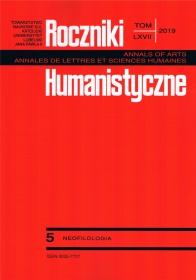Designation of Civil Unions in French and Polish Legal Language
Abstract
This article concerns the designation of civil unions expressed in French and Polish legal language, serving a dual purpose: epistemological and analytical. On the one hand, the relationship between conceptualization and the definition of real entities in the terminological perspective will be examined, as, indeed, terminological investigations, including jurilinguistics, allows for examining the relationship between real entities, concepts as mental constructions, and terms which designate them in languages for specific purposes. On the other hand, the designations of civil unions in the French and Polish law will be compared, demonstrating that sometimes they result from the same legal tradition and, in other cases, reflect cultural changes that inform the coinage of new terminological units.
References
Cornu, Gérard. 2004. Vocabulaire juridique. Paris : PUF.
Depecker, Loïc. 2009. Entre signe et concept : éléments terminologie générale. Paris : Presses Sorbonne Nouvelle.
Depecker, Loïc, et Christophe Roche. 2007. « Entre idée et concept : vers l’ontologie ». Langages 168 : 106–114.
De Saussure, Ferdinand. 1995 [1916]. Cours de linguistique générale. Paris : Payot.
Gałuskina, Ksenia, et Paulina Mazurkiewicz. 2013. « Expression du concept ‘mariage’ en droit français et ‘małżeństwo’ en droit polonais. Étude de corpus ». Roczniki Humanistyczne 59, 8 : 111–129. En ligne. Consulté le 04.01.2019. http://czasopisma.tnkul.pl/index.php/ rh/article/viewFile/4936/5033
Geeraerts, Dirk. 2009. Theories of lexical semantics. Oxford : Oxford Linguistics.
Gilson, Étienne. 1961. Linguistique et philosophie. Essais sur les constantes philosophiques du langage. Paris : Vrin.
Kleiber, Georges. 1999. Problèmes de sémantique. La polysémie en questions. Villeneuve d’Asq : Presses Universitaires du Septentrion.
Krąpiec, Mieczysław. 1995. Język i świat realny. Dzieła XIII. Lublin : RW KUL.
Lerat, Pierre. 1995. Les langues spécialisées. Paris : PUF.
Lerat, Pierre. 2010. « Variabilité et harmonisation terminologiques ». Actes du colloque Assiterm 2009. Publif@rum 12. Consulté le 04.01.2019. http://publifarum.farum.it/ezine_articles.php? art_id=165.
Lerat, Pierre. 2016. Langue et technique. Paris : Hermann, 2016
Maryniarczyk, Andrzej. 2011. « Rola języka naturalnego w metafizyce realistycznej ». Roczniki Humanistyczne 59, 8 : 7–22. En ligne. Consulté le 04.01.2019. http://czasopisma.tnkul.pl/ index.php/rh/article/viewFile/6413/6513.
Mazurkiewicz, Paulina. 2015. Terminologie française et polonaise relative à la famille. Analyses fondées sur les documents de la doctrine sociale de l’Église Catholique. Frankfurt am Main : Peter Lang. DOI: https://doi.org/10.3726/978-3-653-05512-2.
Pietrzykowski, Krzysztof (éd.). 2012. Kodeks rodzinny i opiekuńczy. Komentarz. Warszawa : C.H. Beck.
Roche, Christophe. 2007 « Le terme et le concept : fondements d’une ontoterminologie ». TOTh 2007. Terminologie et Ontologie. Théories et Applications. Jun 2007, Annecy, France, 1–22. hal-00202645f.
Roche, Christophe. 2008. « Quelle terminologie pour les sociétés de l’information ? ». Cahiers de linguistique 33, 1 : 139–160.
Sager, Juan. 2000. « Pour une approche fonctionnelle de la terminologie ». In Le sens en terminologie. Édit par Henri Béjoint et Philippe Thoiron, 40–60. Lyon : Presses Universitaires de Lyon.
Thomas d’Aquin. 2002. Question disputée sur la vérité. Paris : Vrin.
Wüster, Eugen. 1968. The Machine Tool. An interlingual Dictionnary of Basic Concepts. London : Technical Press.
Wüster, Eugen. 1979. Einführung in die allgemeine Terminologielehre und terminologische Lexicographie. Wien : Springer.
Copyright (c) 2019 Roczniki Humanistyczne

This work is licensed under a Creative Commons Attribution-NonCommercial-NoDerivatives 4.0 International License.





